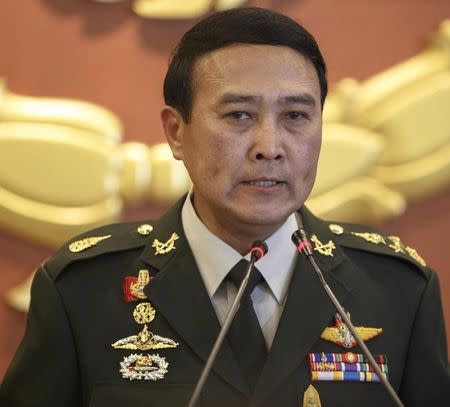Thai army chief calls on all to protect monarchy

By Amy Sawitta Lefevre BANGKOK (Reuters) - Thailand's army chief warned on Wednesday people not to break a strict law protecting the monarchy as the defence minister vowed to prosecute violators of the law who live abroad. Thailand's strict lese-majeste law makes it a crime to defame, insult or threaten the monarchy. Those who are found guilty face up to 15 years in prison. The warning from army chief General Udomdej Sitabutr comes at a time of heightened anxiety over the health of the revered but ailing King Bhumibol Adulyadej, 87, and the issue of royal succession. It also follows a high-profile corruption investigation involving the police, military and several family members of Srirasmi Suwadee, the third consort of Crown Prince Vajiralongkorn. Srirasmi, formerly known as Princess Srirasmi, relinquished her royal title last week. Udomdej called on Thais to protect the royal institution and abide by the law protecting it. "There are people who violate this law and this worries Prime Minister Prayuth. Most people love and respect the monarchy but there are some who think differently," Udomjej told reporters, referring to his predecessor as army chief, Prayuth Chan-ocha. "I ask for cooperation from all Thais to help protect the monarchy." Prayuth seized power in a coup on May 22 after months of protests against a government loyal to an influential ousted premier, Thaksin Shinawatra. Under military rule, lese-majeste charges have skyrocketed and Prayuth, a staunch royalist, has repeatedly vowed to root out critics of the monarchy. Deputy Prime Minister Prawit Wongsuwan, who is also defence minister, said the government was seeking the extradition of lese-majeste suspects living abroad. "We must bring these Thais back to face justice," he said. Rights groups say the junta has used the laws to intimidate its critics, something the government denies. King Bhumibol's health and anxiety over the succession have formed part of the backdrop to a complex political crisis that has seen rival business and political factions jostle for primacy in a nearly decade-long, sometimes bloody, struggle. The king's son and presumed heir, Crown Prince Vajiralongkorn, does not yet command his father's popular support. (Additional reporting by Pracha Hariraksapitak; Editing by Robert Birsel)

